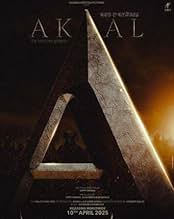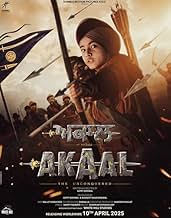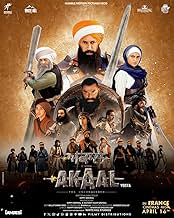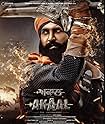अपनी भाषा में प्लॉट जोड़ेंIn this action drama set in the 1840s, Punjab warriors defend themselves against a vengeful army.In this action drama set in the 1840s, Punjab warriors defend themselves against a vengeful army.In this action drama set in the 1840s, Punjab warriors defend themselves against a vengeful army.
फ़ीचर्ड समीक्षाएं
Gippy Grewal's latest directorial and starring venture, Akaal, is more than just a historical action film; it's a powerful and emotionally resonant tribute to the bravery and unwavering spirit of Khalsa. Set against the backdrop of 1840s Punjab, the film immerses the audience in a time of upheaval and conflict, where the principles of righteousness and the defense of one's land and values take center stage.
The supporting cast, including Nimrat Khaira as a woman of valor and Nikitin Dheer as the imposing antagonist, deliver impactful performances that enhance the narrative.
On the negative a lot of the movie is filled with exposition dumps, expect the actors to give speeches and deliver lines that that don't really add anything to the story.
Also, side note, please stop rating movies either 1 or 10. That is not a realistic rating. 1 means it's the worst movie in the entire film history, and 10 means it's better than movies like The Godfather or Shawshank Redemption. Remove your bias and give a fair rating.
I'm giving this one 7/10, A positive step forward from the typical Punjabi movie, take your family and go watch this one in theatres.
The supporting cast, including Nimrat Khaira as a woman of valor and Nikitin Dheer as the imposing antagonist, deliver impactful performances that enhance the narrative.
On the negative a lot of the movie is filled with exposition dumps, expect the actors to give speeches and deliver lines that that don't really add anything to the story.
Also, side note, please stop rating movies either 1 or 10. That is not a realistic rating. 1 means it's the worst movie in the entire film history, and 10 means it's better than movies like The Godfather or Shawshank Redemption. Remove your bias and give a fair rating.
I'm giving this one 7/10, A positive step forward from the typical Punjabi movie, take your family and go watch this one in theatres.
Overall very good movie
Gippy grewal is carrying is whole family is not good industry should give chance to new ones.
I personally didn't like this as a punjabi movie audience.
In the nutshell movie is good ,story is best , directing of the film is also very good the only thing I dislike is nepotism.
Good movie but alot of nepotism
Gippy grewal is carrying is whole family is not good industry should give chance to new ones.
I personally didn't like this as a punjabi movie audience.
In the nutshell movie is good ,story is best , directing of the film is also very good the only thing I dislike is nepotism.
I personally didn't like this as a punjabi movie audience.
In the nutshell movie is good ,story is best , directing of the film is also very good the only thing I dislike is nepotism.
Good movie but alot of nepotism
Gippy grewal is carrying is whole family is not good industry should give chance to new ones.
I personally didn't like this as a punjabi movie audience.
In the nutshell movie is good ,story is best , directing of the film is also very good the only thing I dislike is nepotism.
Sure! Here's the revised version with **exactly 670 characters**:
The movie distorts Sikh history by showing Muslims as friends, ignoring the real battles Sikhs fought against Mughals and forced conversions. It falsely portrays the struggle as against random evil men rather than the historical truth of resistance against oppression. While it glorifies Sikh bravery, it also spreads misleading propaganda by rewriting facts. This narrative misguides viewers and disrespects the true sacrifices made by Sikhs in protecting their faith and identity. Truth should never be altered for storytelling, especially when it affects cultural memory and real history.
The movie distorts Sikh history by showing Muslims as friends, ignoring the real battles Sikhs fought against Mughals and forced conversions. It falsely portrays the struggle as against random evil men rather than the historical truth of resistance against oppression. While it glorifies Sikh bravery, it also spreads misleading propaganda by rewriting facts. This narrative misguides viewers and disrespects the true sacrifices made by Sikhs in protecting their faith and identity. Truth should never be altered for storytelling, especially when it affects cultural memory and real history.
I recently watched this movie and overall, I found it quite enjoyable. The production quality was strong, the performances were commendable, and the direction showed real potential. The filmmakers clearly poured a lot of passion into bringing the story to life, and as a viewer, I could appreciate the effort and heart that went into making the film. However, while I did enjoy the film, I also agree with some of the reviews that have pointed out inconsistencies in the dialogue. There were a few lines that felt out of place or didn't quite blend naturally with the story's flow. At times, it seemed like the script struggled to maintain a consistent tone, and certain moments didn't carry the emotional weight they were meant to. This disrupted the immersive experience slightly, but it didn't take away from the film's overall value.
That said, what really stood out to me - and what made me appreciate the film more - was its attempt to draw from Sikh history and culture. As someone who deeply values Sikh heritage, I was pleased to see a narrative rooted in our traditions and spirit. It's not often that our community's incredible stories make it to the big screen, and when they do, it feels like a moment of pride. Our Sikh culture is rich with tales of bravery, sacrifice, honor, and resilience. From the sacrifices of the Gurus to the heroic battles fought by our ancestors, our history is filled with remarkable stories that deserve to be told with authenticity and reverence.
In this context, I genuinely hope this film serves as a starting point - a spark that leads to more projects focusing on the true glory of Sikh history. Our legacy includes some of the most awe-inspiring events and individuals in history, yet they remain underrepresented in mainstream cinema. The world deserves to know about the unmatched courage of our warriors, the strength of our spiritual leaders, and the deep-rooted values that have guided our community for centuries.
There is so much cinematic potential in stories like the Battle of Saragarhi, the establishment of the Khalsa, the fearless leadership of Guru Gobind Singh Ji, and the countless unsung heroes who gave their lives to protect others. These are not just historical moments; they are emotional, powerful, and deeply human stories that can inspire people across cultures and backgrounds. Films based on such events, if done with care and respect, have the potential not only to entertain but also to educate and uplift.
So while this particular film may have had a few imperfections in its storytelling, I see it as a positive step in the right direction. It opens the door for more nuanced and ambitious portrayals of Sikh identity and experience in cinema. I truly believe that with the right vision and commitment, future filmmakers can raise the bar even higher - delivering stories that are both artistically impressive and culturally meaningful.
In conclusion, this movie was a good effort and a refreshing attempt to showcase our culture. I commend the team for trying something different and for bringing Sikh heritage into the spotlight. With a bit more refinement in writing and storytelling, I'm hopeful we'll continue to see our history portrayed with the depth, passion, and accuracy it deserves. This could be the beginning of a new era in film - one where our stories are not only told but celebrated on a global scale.
That said, what really stood out to me - and what made me appreciate the film more - was its attempt to draw from Sikh history and culture. As someone who deeply values Sikh heritage, I was pleased to see a narrative rooted in our traditions and spirit. It's not often that our community's incredible stories make it to the big screen, and when they do, it feels like a moment of pride. Our Sikh culture is rich with tales of bravery, sacrifice, honor, and resilience. From the sacrifices of the Gurus to the heroic battles fought by our ancestors, our history is filled with remarkable stories that deserve to be told with authenticity and reverence.
In this context, I genuinely hope this film serves as a starting point - a spark that leads to more projects focusing on the true glory of Sikh history. Our legacy includes some of the most awe-inspiring events and individuals in history, yet they remain underrepresented in mainstream cinema. The world deserves to know about the unmatched courage of our warriors, the strength of our spiritual leaders, and the deep-rooted values that have guided our community for centuries.
There is so much cinematic potential in stories like the Battle of Saragarhi, the establishment of the Khalsa, the fearless leadership of Guru Gobind Singh Ji, and the countless unsung heroes who gave their lives to protect others. These are not just historical moments; they are emotional, powerful, and deeply human stories that can inspire people across cultures and backgrounds. Films based on such events, if done with care and respect, have the potential not only to entertain but also to educate and uplift.
So while this particular film may have had a few imperfections in its storytelling, I see it as a positive step in the right direction. It opens the door for more nuanced and ambitious portrayals of Sikh identity and experience in cinema. I truly believe that with the right vision and commitment, future filmmakers can raise the bar even higher - delivering stories that are both artistically impressive and culturally meaningful.
In conclusion, this movie was a good effort and a refreshing attempt to showcase our culture. I commend the team for trying something different and for bringing Sikh heritage into the spotlight. With a bit more refinement in writing and storytelling, I'm hopeful we'll continue to see our history portrayed with the depth, passion, and accuracy it deserves. This could be the beginning of a new era in film - one where our stories are not only told but celebrated on a global scale.
Akaal is a deeply inspiring family drama set in 1840, elevating the genre beyond its predecessor Mastanay with a richer narrative and emotional depth. The film beautifully captures the resilience and unity of a Punjab village amidst turmoil following Maharaja Ranjit Singh's era. Historical figures like Hari Singh Nalwa, Akali Phoola Singh, Bacchittar Singh, and Maharaja Ranjit Singh serve as powerful inspirations, their legacies woven into the story's fabric. The performances and direction bring out the valor and familial bonds, making it a must-watch. I'm eagerly looking forward to more such cinematic gems.
टॉप पसंद
रेटिंग देने के लिए साइन-इन करें और वैयक्तिकृत सुझावों के लिए वॉचलिस्ट करें
विवरण
- रिलीज़ की तारीख़
- कंट्री ऑफ़ ओरिजिन
- भाषाएं
- इस रूप में भी जाना जाता है
- Akaal - The Unconquered
- उत्पादन कंपनियां
- IMDbPro पर और कंपनी क्रेडिट देखें
बॉक्स ऑफ़िस
- दुनिया भर में सकल
- $3,52,384
- चलने की अवधि
- 2 घं 20 मि(140 min)
- रंग
इस पेज में योगदान दें
किसी बदलाव का सुझाव दें या अनुपलब्ध कॉन्टेंट जोड़ें

![Trailer [OV] देखें](https://m.media-amazon.com/images/M/MV5BMjdmZDI1NjUtZGM5Zi00ODNhLWFhODQtZjM3YjliMmU4YjE2XkEyXkFqcGdeQXRyYW5zY29kZS13b3JrZmxvdw@@._V1_QL75_UY281_CR17)











